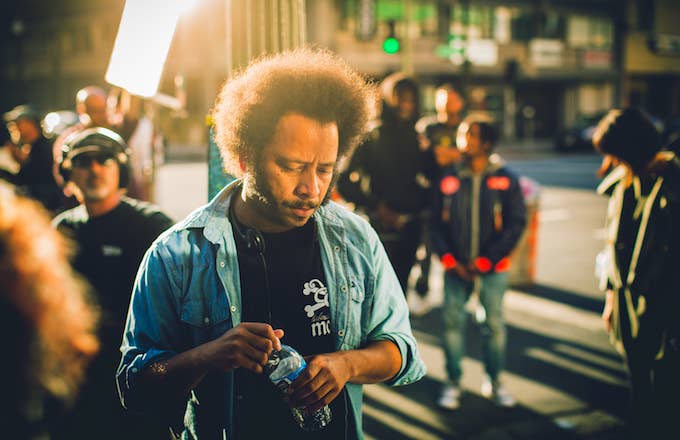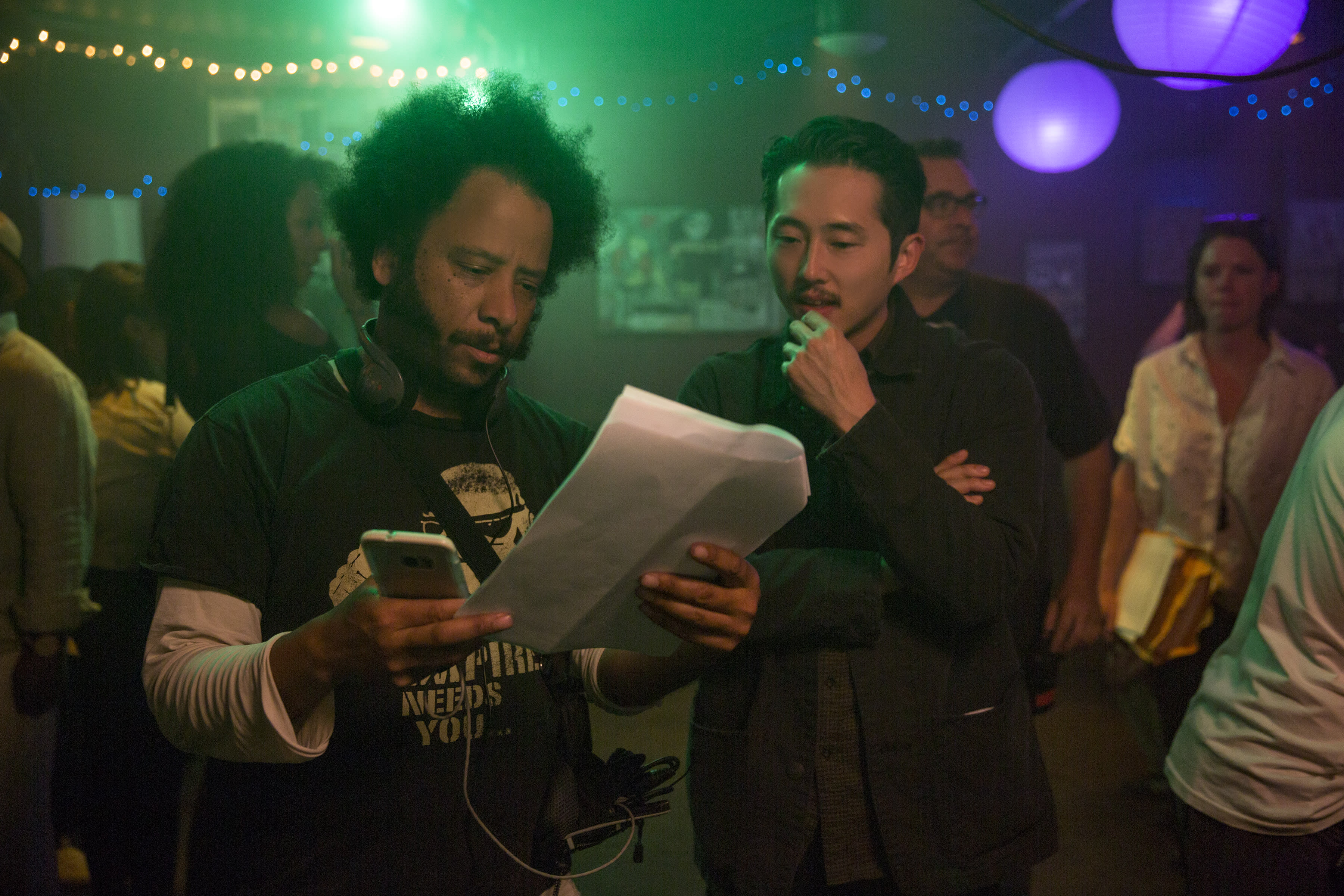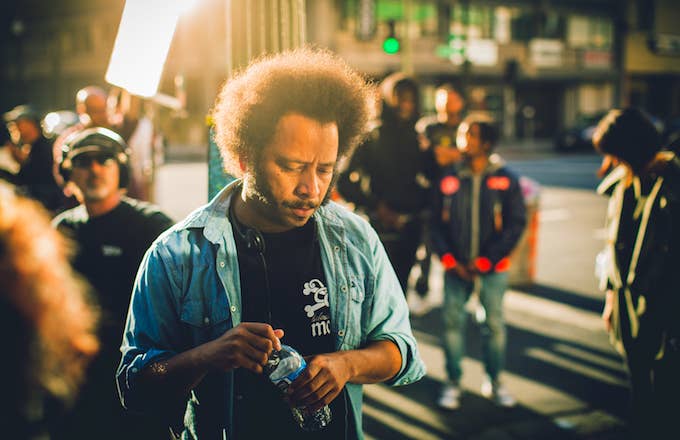
Boots Riley is the writer and director of one of this summer’s most-buzzed-about films, Sorry to Bother You. The movie, which stars Atlanta’s Lakeith Stanfield and Thor: Ragnarok standout Tessa Thompson, follows a man named Cassius Green (Stanfield) who starts work at a telemarketing company and...well, to say any more would be to give away too much. But the movie is a delight—a surreal, funny, political, and pointed satire about capitalism, race, the tech world, art, and how to choose the right pair of earrings for any occasion.
However, long before he was an acclaimed writer/director, Boots Riley was a rapper. He’s been releasing music as the lead MC and songwriter of The Coup since 1991 and has put together half a dozen albums of funky, smart, and wildly creative songs. He also teamed up with Rage Against the Machine’s Tom Morello several years ago to form the group Street Sweeper Social Club. And in case you couldn’t tell from song titles like “5 Million Ways to Kill a C.E.O.” and “I Love Boosters!”, Riley is also an activist and organizer. He joined the Progressive Labor Party when he was just 15, and has been a revolutionary voice on and off the mic ever since.
I caught up with Boots via phone the day after seeing his film. Spoiler alert: While we don’t reveal any major plot points or surprises in Sorry to Bother You, we do discuss some specifics about character and story.
I saw the movie last night and I loved it. Congratulations.
Thank you so much. I’m glad people seem to be having a hopeful reaction to it.
I was talking to a rapper a few weeks ago, and he was saying that the thing he liked about songwriting was that it had every aspect of creativity to deal with except the visual. It got me thinking: you have been doing that for so long—using almost every artistic tool except the visual. So how was it this time telling a story primarily through visual means?
I don't know. I guess I'm different than that person because as you see from songs like “Fat Cats, Bigga Fish” and “Me and Jesus the Pimp in a ’79 Granada Last Night,” I’m seeing stuff while I’m writing. Even the songs that aren't story songs. I’m picturing the video for it while I'm writing it even if I know this is probably a song that won't get a video. Even when I’m listening to music, I’m picturing stuff. It's always been visual to me. That's guided my lyric writing as well. So with this, it wasn't that far of a jump. I’ve also been involved in all of our videos even though I only directed one of them [for “Me and Jesus…”]. I co-directed that with my friend Chris Wroubel.
But the other ones I wrote the treatments for and did storyboards for them, because a lot of times the label would have [a director] who was from out of town. I would be picking locations. I would camp out in the edit suite with them and I would be a part of the decision-making process, as well.
I started out in film school, and that may have been why I got into songwriting that way. It's cheaper films. But I think about the stuff that gets me excited, like Ice Cube, “Once Upon a Time in the Projects”—how can you listen to that and not be picturing something? That was my pinnacle of story to reach for.
You’ve had extended narratives in your music before: four or five songs linked together with narration or skits. What was different this time telling an even longer story?
Doing it with music, it's not as straightforward as for me with film. A lot of times when I am making something to do with music, I’m taking conversations that have happened in my life or I have observed or [people have] told me about and converting them into poetry. With this, I didn’t have to do any conversions. I just have a scene in my head and I put it down and look for the ways to show that. The creative aspect of making a film and figuring out what to do was a lot easier than making a song for me.

But obviously there are other things that made it hard. With a film, we have a 90-person crew, so you gotta work with all of these folks. I have never been a part of a real crew musically. That changed with this. I have a production designer, a costume designer, a cinematographer. I have to work with them and go back and forth on what I want done versus what can be done with the budget versus what physically is able to happen in the time, and those sorts of things that become constraints. Whereas with music, the collaboration came in the form of working with musicians. We can do anything in music. Like, “Hey, you wanna make one hour-long song?” We can do that. This, you’re like, “I want the telemarketing floor to look like it goes on into infinity.” “Well, here's why we can't do that” or “Here’s why we can.”
Sorry to Bother You was, to me, not that different from a Coup album. The tone and the humor and the worldview was pretty recognizably you.
It's all alike to me. This is just an extension of what I have always been doing, even form-wise. You think about the songs that we have done—“5 Million Ways to Kill a C.E.O.” had a 9/17 [time signature] count. But we were able to hide it with a 4/4 beat going through it. So nobody knew that.
Maybe throughout my whole career it would have been better to [say], “Let me figure out what Dr. Dre is doing and do that” or “Take what the Roots are doing and put my politic on it and do that.” But I also am an artist and I do have some kind of an ego. I also think that ideas are clearer when they come from a personal viewpoint. So from the beginning, different has always been a big part of it.
You can look at the things that we have done, and people are scratching their heads and are like, “This is not how you are supposed to make a song. It's not what you are supposed to do.” [Laughs.] That's the same thing with this movie. I did stuff not to be different, but when I needed to achieve something emotionally or thematically, I didn't just go for the easy thing—meaning cliché. Because everybody is going for the easy thing, so you’ve seen it millions of times. I chose to bend reality. Like, instead of having a song that is like, “Fuck all these people who kiss the boss’ ass,” I had a song that was a commercial for a magical pill you take that stops you from kissing the boss’ ass called “Ass-Breath Killers.” So that's kind of how my brain has always worked.
when I needed to achieve something emotionally or thematically, I didn't just go for the easy thing, because you’ve seen it millions of times. I chose to bend reality.
The revolutionary group in the film uses Left Eye of TLC as their inspiration. They entered the music business more or less the same time as you, right?
No, they were a few years before me. I definitely sat at home watching a TLC video for “Aint 2 Proud 2 Beg” and thinking, “Man, one day I’m going to get something together and I’m going to be out there and get to meet them.”
What did Left Eye mean to you and how did that relate to the group in the film?
“Left Eye” the name is about having a radical viewpoint. There’s just a shout-out to a group that I was a fan of, that maybe was a part of what inspired me to have some tenacity early on as we were making demos. Like, “Wow, I wanna be on that level where I could maybe one day meet Left Eye.”
Tessa’s character wears a bunch of earrings throughout that have lyrics and sayings. I noticed that one had lyrics from Bob Dylan’s “The Lonesome Death of Hattie Carroll.” Why that song?
It’s about a tragedy in which a rich dude gets mad—a true story where a rich dude gets mad that his black maid didn’t bring the right drink or something like that and kills her in front of all the guests. That definitely has to do with everything that I've written in my career. [Laughs.] All the earrings are song lyrics. Only one of them is mine.
You’ve been an organizer and radical activist your whole adult life. How was it having the central character in your movie be, if even for only part of the time, a scab?
There’s this idea of activism that has come in a time when there aren’t organizations with a clear agenda of how to create radical social change. Organizations with the agenda of creating radical social change operate much differently than folks who may have come up to be activists outside of that milieu. So a lot of times, you’ll see things on Twitter that are supposed to be coming from activists that are like, “You over there, you’re fucked up. I’m drawing the line. You’re bad. I’m good.” That is not what an organizer does. An organizer is like, “Look, we need to gather people on our team.” We don’t need to be drawing lines in the sand that other folks in the working class are unfavorable and are the enemy.
A lot of times, you’ll see things that are like, “You over there, you’re fucked up.” That is not what an organizer does. An organizer is like, “Look, we need to gather people on our team.”
So it comes from a viewpoint that it’s not people that are evil—it’s the economic system we’re in that creates situations. Every single person in the movie is selling out in some way. Every single person in the movie is also great in some way. It’s more like real life. There are no cartoon characters in this. That’s the truth about these things. Yes, if it’s your workplace battle, then you keep out the scabs. But we also have to be looking at what makes them and how to create a different outcome and get more people on the side of social change.
I’ve seen you onstage before talking about the importance of work stoppages and even the hope of a general strike. You’ve pitched your movie a lot—give me the pitch for work stoppages for our audience. Why is the strike foregrounded in your film?
It’s actually kind of in the background. It’s the most normal thing that’s happening in the movie. Everything that’s happening is against the backdrop of the strike as opposed to the foreground.
But I would say that we all know that those with the money have the power. You could be conservative or progressive and know that. Nobody is arguing, “Oh, the people with the money don’t have the power.” So here’s the thing: the people at their places of work are creating the profit and the power. So if we want to have power, we have to take hold of those reins. We have the ability to stop the wealth and stop the power by withholding our labor. So just on that simple thing, that’s a direct access to power. And that’s the pitch: do we want to have direct access, or do we want to only elect people who we hope will not be paid off by those with money?
This story has been around for a long time and gone through a couple of different iterations. What stayed consistent about Cassius Green in his journey from the song in 2012 where he’s mentioned to the first version of the screenplay [which was published by McSweeney’s in 2014] to now? What have you adjusted?
The screenplay was done before the album [the Coup’s 2012 project, also called Sorry to Bother You] came out. The song was supposed to be a dream he was having that’s related to some of the themes in the movie. But the story has stayed pretty close to the same.
You have a song from 1994 called “Pimps (Free Stylin at the Fortune 500 Club)”. That track ends with someone doing reggae chanting in the character of a guy who is a nouveau riche, loudmouth gasbag who the other rich people put up with, but can’t stand. How does it feel to have that guy be president?
My whole point in all of my songs is that those people are the president without being elected. So to a certain extent it makes it more confusing, because people think that rich, soulless, calculating folks only have power when they are elected.
It’s all the same thing. There’s different groups of people in power. They’ve got different, basically gangs, that sometimes have conflicting interests with each other. Trump is representing a certain group of business people that have different interests than the people that Obama represented had, or that Hillary would have had the interests of. So I think that it’s an opportunity to talk about how our economic system works and how our political system is controlled. But I hope that people don’t think that things are all bad only because Trump is in office.
I saw in the credits of Sorry to Bother You that there were a bunch of new Coup songs. When can we hear them?
They will be coming out in July on Interscope Records. It’s a Coup album that’s a soundtrack to the movie. And the title is The Sun Exploding, but with something that will let people know that it’s the soundtrack to the movie. The weird thing is that, after all these years, it’ll be the most-heard Coup album.



